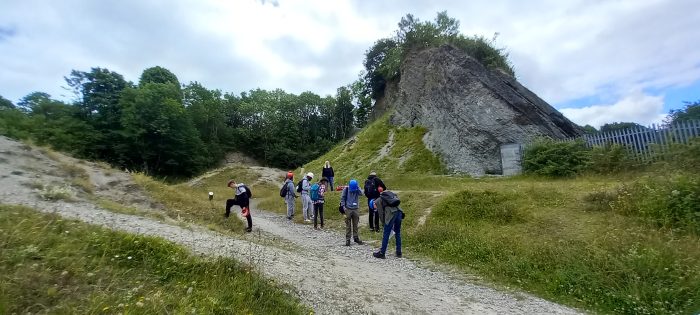Why study Geology?
- Geology is the study of the Earth’s structure and 4.6 billion years of natural history. A science subject, geology underpins the provision of resources to the UK’s population and industry, delivers a wide range of essential services, and helps us understand how we can live more sustainably on our planet (Geological Society).
- Geologists use aspects of other scientific subjects such as Geography, Chemistry, Biology, and Physics to study the Earth, its history and processes. We can apply our understanding of the past to current environmental issues such as climate change and mass extinction.
- A problem solving approach will be used so that theoretical ideas can be applied to real geological situations and you will develop practical skills through field and laboratory work.
- Geology opens doors to many careers including engineering, mining, hazard management, energy, water and waste management, scientific research and environmental management and conservation and also leads to academic disciplines such as palaeontology.
Why study Geology at Solihull Sixth Form College?
- Geology lessons will often involve the investigation of rock, fossil and mineral specimens in addition to geological maps. We have a dedicated ‘rock room’ with an extensive and unique collection of rocks, minerals and fossils to support your studies.
- Fieldwork is compulsory and there will be opportunities to investigate rocks in situ. Visits to local museums and university rock collections will be organised and we have established links with the Lapworth Museum of Geology.
- Teachers are experienced subject specialists and encourage learners to develop their knowledge and skills in a supportive and purposeful classroom environment.
Course Outline
Component 1 – Geological Investigations – Exam – Short answers and a practical test
• Elements, minerals and rocks and how they form
• Geological processes and the rock cycle
• Geological time and change
• Earth structure and global plate tectonics
Component 2 – Geological Principles and Processes – Exam – Data response questions
• Rock forming processes (igneous, sedimentary and metamorphic rocks)
• Rock deformation and structural geology
• Past life (palaeontology – including dinosaur evolution) and past climates
• Earth materials and natural resources (coal, oil, gas, water, minerals, metals)
Component 3 – Geological Applications – Exam – Short answers with some extended writing
• Geohazards and their management (volcanoes, earthquakes, landslides and engineering geology)
• Geological maps and their uses
• Ice ages and Quaternary Geology (the last 2 million years of Earth history)
Assessment
Examination (100%)
No coursework, but there are compulsory practical assessments and fieldwork activities that are required in order to achieve the practical endorsement.
Examining Board – Eduqas
Special Entry Requirements
A minimum grade 6 in Maths and grade 6s in two separate sciences or grade 6-6 in Combined Science are required. Standard A level entry requirements also apply.
Prohibited Options
None. Although Geology sounds similar to Geography, the two subjects are very different in their content and can be studied together as part of an A level programme.
What do our learners go on to do?
You can progress to university – Geology is a degree subject in its own right but it also supports degrees and careers in engineering, surveying and construction (particularly civil engineering) and can lead to jobs in the oil industry, in mining and extraction of minerals, and in environmental industries such as waste and water management. It is a science subject, so would also gain credit to support applications to science-based degrees and careers. It is also a useful subject if you are considering Geography or Environmental Science at university.
Cost Implications
Fieldwork is a compulsory part of the course and each learner must spend a minimum of four days investigating geological issues outside of the classroom. There will be a small charge for transport to access local geological sites, but we anticipate that this will be less than £60 for the two-year course. There may be opportunities for residential field trips, but these will be on a voluntary basis.
Complementary Subjects or Enrichment Courses
Geology learners can also join the annual Model United Nation conference and the Team Gambia expedition. Core Maths can also support those students who are not undertaking A Level Maths. The Extended Project Qualification (EPQ) is an opportunity for Geologists to conduct research in a specific part of the discipline.
This information is correct for September 2024 entry.


